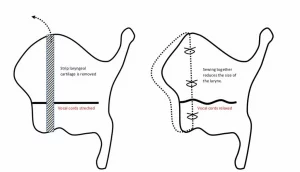Voice loss can be a frightening experience, leaving you unable to communicate effectively and wondering when your voice will return. Mr Nick Hamilton, a consultant laryngologist practicing at The London Clinic and One Welbeck, regularly treats patients experiencing complete or partial voice loss.
His fellowship training at the MGH Voice Center in Boston, combined with his PhD research into voice box disorders, provides him with comprehensive expertise in treating voice loss conditions.
What are the main causes of voice loss?
Voice loss typically results from inflammation or injury to your vocal cords, preventing them from vibrating normally to produce sound. Viral infections are the most common cause, often following cold or flu symptoms.
Vocal abuse from shouting, excessive talking, or improper voice use can lead to swelling and subsequent voice loss. This is particularly common among professional voice users who don’t employ proper vocal techniques.
Other causes include allergic reactions, acid reflux, and more serious conditions such as vocal cord paralysis or neurological disorders affecting voice production that Mr Hamilton specialises in treating.
How long does voice loss typically last?
Most cases of voice loss resolve within 3-7 days when caused by viral infections or mild vocal strain. However, voice loss persisting beyond two weeks requires evaluation by a specialist like Mr Hamilton.
Professional singers and speakers often experience longer recovery times due to the demanding nature of their vocal requirements and the need for complete healing before returning to intensive voice use.
Studies indicate that 90% of acute voice loss cases resolve completely with appropriate treatment and voice rest, though specialist guidance improves outcomes significantly.
What immediate steps should I take when I lose my voice?
Complete voice rest is crucial during the acute phase of voice loss. This means avoiding whispering, which can actually strain your vocal cords more than normal speech.
Stay well-hydrated by drinking plenty of water and using a humidifier to keep your throat moist. Avoid alcohol, caffeine, and smoking, as these can worsen vocal cord irritation.
Steam inhalation can provide temporary relief, but avoid menthol or eucalyptus, which may cause further irritation to sensitive vocal tissues.
When should I consult Mr Hamilton?
Seek immediate consultation if voice loss is accompanied by severe throat pain, difficulty swallowing, or breathing problems. These symptoms could indicate more serious conditions requiring urgent medical attention.
Mr Hamilton recommends professional evaluation for any voice loss lasting more than two weeks, particularly if you’re a professional voice user or have recurring episodes.
His expertise in complex voice disorders, gained through his Boston fellowship and ongoing research, means he can identify conditions that other practitioners might miss.
What treatment options does Mr Hamilton offer?
Voice therapy is often the first-line treatment for voice loss, teaching proper vocal techniques and helping prevent future episodes. Mr Hamilton works with qualified speech therapists to provide comprehensive care.
Medical treatments may include anti-inflammatory medications, acid reflux management, or treatment for underlying conditions contributing to voice loss.
In severe cases, surgical intervention might be necessary, particularly when voice loss results from structural problems or persistent vocal cord lesions. Mr Hamilton’s surgical training in complex voice disorders enables him to offer advanced surgical solutions when required.
How can I prevent future voice loss?
Proper vocal hygiene is essential for preventing voice loss. This includes staying hydrated, avoiding excessive throat clearing, and using appropriate volume levels when speaking.
Mr Hamilton recommends warming up your voice before intensive use, just as athletes warm up before exercise. Simple humming or gentle vocal exercises can prepare your voice for demanding activities.
Regular consultation with Mr Hamilton can help identify risk factors and provide personalised strategies for maintaining optimal vocal health throughout your life. You can book an appointment at The London Clinic or One Welbeck by calling 020 7034 6053.



